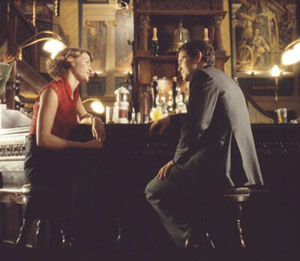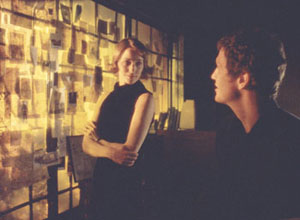
In a classic old, dark house, Simon Puritan (Nick Moran) channels the dead for paying customers. A drunk, Simon lost his job as a journalist and fruitlessly researches a book about London and the paranormal, and though his day job may seem like an act, the truth could be a little more ambiguous.
Just as his life feels as if it will unravel out of control, Simon meets a mysterious, disfigured stranger who claims to be the husband of a client he has booked, pleading with Simon to fix the reading by offering details he hopes will end his wife’s bereavement.
Simon finds himself falling for this client, Ann (Georgina Ryland), but also discovers that the stranger is not who he claims to be. Ann’s real husband is Eric Bridges (David Soul), the head of a sinister think tank that is alleged to have involvement in everything from organised crime to the occult, and Simon soon finds himself lost in a maze of conspiracy and betrayal with only the disfigured stranger acting as a suspicious ally.
Puritan is a highly ambitious independent film from writer/director Hadi Hajig, taking in elements of classic film noir and occult conspiracy to drive the story. One of the first things to hit you is the brooding interior of Simon’s home. The stifling atmosphere really helps bring to life the ideas of Victorian conspiracy and channelling the dead.
 The film makes much of its arcane sets and of London’s twisted past, including Christ Church in Spitalfields and Simon’s home, which is claimed to have been built by the same architect, Nicholas Hawksmoor. Hawksmoor is often referred to as the Devil’s Architect, due to the seemingly pagan symbols found in many of his buildings, and is often cited as part of Masonic conspiracies, such as that found in From Hell, Alan Moore’s excellent graphic novel about Jack the Ripper. Jack also features in the film, in the origins of the Chapman Group think tank, which apparently originated when chaplains got together in Whitechapel (near Christ Church) to present good to the world and counteract the evil of the Ripper in the late 19th Century. Added to the mix is the suggestion that Aleister Crowley once summoned the devil in the building that Simon now calls home.
The film makes much of its arcane sets and of London’s twisted past, including Christ Church in Spitalfields and Simon’s home, which is claimed to have been built by the same architect, Nicholas Hawksmoor. Hawksmoor is often referred to as the Devil’s Architect, due to the seemingly pagan symbols found in many of his buildings, and is often cited as part of Masonic conspiracies, such as that found in From Hell, Alan Moore’s excellent graphic novel about Jack the Ripper. Jack also features in the film, in the origins of the Chapman Group think tank, which apparently originated when chaplains got together in Whitechapel (near Christ Church) to present good to the world and counteract the evil of the Ripper in the late 19th Century. Added to the mix is the suggestion that Aleister Crowley once summoned the devil in the building that Simon now calls home.
 For a film steeped in the occult, it doesn’t rely on any potentially ruinous special effects, instead relying on the strength of the actors, and surprisingly it brings up interesting questions concerning time, free will and destiny. Whilst presenting a London we are not likely to recognise Puritan succeeds in creating its own world, which only serves to strengthen the story.
For a film steeped in the occult, it doesn’t rely on any potentially ruinous special effects, instead relying on the strength of the actors, and surprisingly it brings up interesting questions concerning time, free will and destiny. Whilst presenting a London we are not likely to recognise Puritan succeeds in creating its own world, which only serves to strengthen the story.
All these elements combine along with the more usual noir theme of a dangerous affair and a decent script to generate a thrilling level of tension, keeping the audience in almost as much dark as Simon.
This complexity, however, also acts as one of the film’s drawbacks as all the conspiracy theories thrown around make for a slightly confusing web, though it does give some indication as to how Simon feels later on. Whilst it is heartening that Hadi Hajaig had the courage to resist the temptation of offering the story on a plate, it is a touch labyrinthine and I imagine that most people will leave the film without a complete grasp of what happened.
Puritan is not a great film, with the occasional clumsy piece of dialogue (watch for the fourth dimension explanation) and Nick Moran not entirely convincing as a washed-up drunk (though good playing the other aspects of Simon’s character), but on the whole it succeeds in making an interesting and taut little drama and serves as a reminder that you don’t need a large budget to make a quality movie.
Well worth a watch.
Ross Taylor
